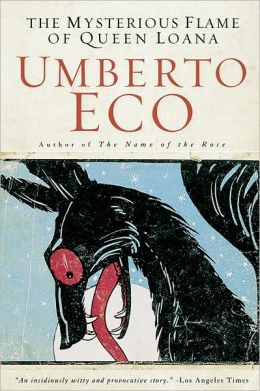 |
| Image courtesy of www.barnesandnoble.com |
Umberto Eco
2004
The Summary
After suffering a major stroke, Yambo is faced with a terrifying crisis: he can't remember anything. He can't remember who he is; he can't remember the names and faces of his children, his wife, his mother or father or sister; and he certainly can't recall his own childhood. Yambo, however, remembers everything he ever read.
Faced with this gaping memory loss, Yambo goes in search of all the things he read as a child and all the journals he kept. All in the hope of stirring some spark within him, some mysterious flame of recognition.
His story, now as an old man, is not a tale of self-discovery but of rediscovery as he struggles to remember who he was, who he is, and how he got there.
The Good
The Mysterious Flame of Queen Loana is a book full of helpful illustrations and beautiful imagery. In this book, Umberto Eco commands a superb vocabulary (although I can likely thank the translator, Geoffrey Brock, for his contribution as well) and reveals he has a capacity for detailed description that's difficult to rival.
Additionally, Eco creates a wonderful narrator in Yambo. He's witty and sarcastic - frequently sardonic - but he's also bright and highly aware. Short of what he has forgotten with his stroke, Yambo doesn't miss much and he's able to express so much more.
Yambo is a fabulous narrator, because he's observant but, also, because he's able to communicate so successfully. He can express uncertainty and fear just as well as he can express joy and happiness. His emotions and thoughts are candid, unfiltered, which makes him accessible. We can understand him, and he can understand us.
The Bad
At the beginning of Eco's novel, the reader learns that Yambo has survived a massive stroke and lost much of his memory. As such, we realize that not everything Yambo does or says is clearly defined. In fact, his thoughts can sometimes prove to be elusive and confusing when he makes sincere attempts to reclaim the scattered bits of his memory.
More to the point, Yambo's memory starts to spiral out of control at certain points. At one point, you have a virtual "sensory overload" with all the stories, memories, songs, and images that converge all at once. There's too much to process and too much to understand.
It's confusing and bewildering - and the slightest bit overwhelming.
The Ugly
Personally, I didn't really know what to think about detailed descriptions on preserved dog testicles or musings on defecating.
Just saying, it was a little awkward.
No comments:
Post a Comment